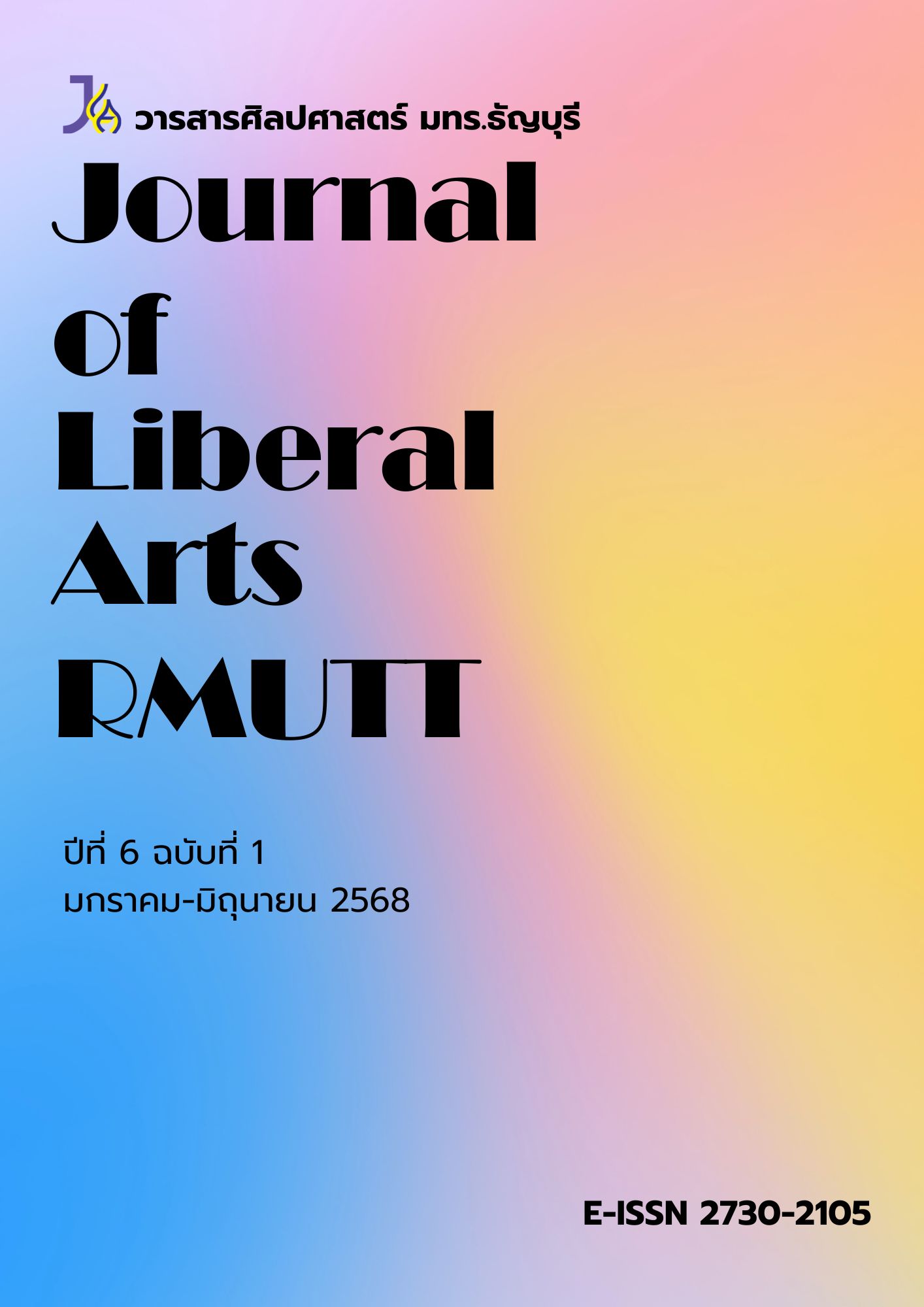Community Participation in Sustainable Tourism Management Based on a Community-Based Approach: Ban Koh Mon Community, Sam Roi Yot District, Prachuap Khiri Khan Province
DOI:
https://doi.org/10.60101/jla.2025.6.1.6847Keywords:
participation, sustainable tourism, community basedAbstract
This article aims to 1) Study the level of community participation in sustainable community-based tourism management in Ban Koh Mon community, Sam Roi Yot District, Prachuap Khiri Khan Province. 2) Compare personal factors with the participation of the public in sustainable community-based tourism management in Ban Koh Mon community, Sam Roi Yot District, Prachuap Khiri Khan Province. 3) Examine the relationship between the perception of information regarding sustainable tourism management and community participation in sustainable community-based tourism management in Ban Koh Mon community, Sam Roi Yot District, Prachuap Khiri Khan Province. This is a quantitative research study. Data were collected using a questionnaire from a sample of 400 participants selected through convenience sampling. The data were analyzed using percentage, mean, standard deviation, t-test, one-way analysis of variance (One-way ANOVA), and Pearson's correlation coefficient analysis. The study found that. The overall level of community participation in sustainable community-based tourism management was high ( = 4.38). When considering each aspect, it was found that the aspects of giving opinions, planning, and decision-making, as well as implementation and operation, had a high average score. The aspect of monitoring and evaluation also had a high average score in all areas. The comparison between personal factors and public participation in sustainable community-based tourism management revealed that gender differences did not result in different levels of participation. However, differences in age, educational level, occupation, length of residence in the area, and average income led to statistically significant differences in participation in sustainable community-based tourism management at the 0.05 level. The relationship between the perception of information regarding sustainable tourism management and community participation in sustainable community-based tourism management was found to be at a high level. This indicates a positive correlation between information perception and participation: as the perception of information increases, the level of community participation in sustainable community-based tourism management also increases.
References
กิตติพงษ์ พิพิธกุล. (2561). คุณภาพเครื่องมือแบบสอบถาม: Validity กับ Reliability ในการวิจัยทางรัฐประศาสนศาสตร์. วารสารวิชาการและวิจัย มหาวิทยาลัยภาคตะวันออกเฉียงเหนือ. 8(2), 104-110.
ขนิจฐา ชัยบิล. (2563). ปัจจัยที่ส่งผลต่อการมีส่วนร่วมของประชาชนในการส่งเสริมการท่องเที่ยวชุมชนท่องเที่ยว OTOP นวัตวิถี ในเขตอำเภอนาทม จังหวัดนครพนม [วิทยานิพนธ์ปริญญามหาบัณฑิต ไม่ได้ตีพิมพ์]. มหาวิทยาลัยราชภัฏสกลนคร.
ชูศรี วงศ์รัตนะ. (2544). เทคนิคการใช้สถิติเพื่อการวิจัย. จุฬาลงกรณ์มหาวิทยาลัย.
ธนาคารแห่งประเทศไทย. (2567). สถิติดุลบัญชีเดินสะพัด ส่วนสถิติภาคต่างประเทศ ธนาคารแห่งประเทศไทย. ธนาคารแห่งประเทศไทย.
บัณฑิตย์ พิณอุดม. (2567). “Future of tourism" รับมือการเปลี่ยนผ่านสู่การเติบโตอย่างมีคุณค่าและยั่งยืน. ธนาคารแห่งประเทศไทย. https://www.bot.or.th/th/research-and-publications/articles-and-publications/articles/article-2024nov12.html
ประพันธ์ ลีน้อย. (2567). Sustainable tourism จับตาการท่องเที่ยวแนวใหม่ที่ใส่ใจความยั่งยืน. ธนาคารกรุงศรีอยุธยา จำกัด (มหาชน). https://www.krungsri.com/th/research/research-intelligence/sustainable-tourism-2024
พวงรัตน์ ทวีรัตน์. (2543). วิธีการวิจัยทางพฤติกรรมศาสตร์และสังคมศาสตร์ (พิมพ์ครั้งที่ 7). สำนักทดสอบทางการศึกษาและจิตวิทยา มหาวิทยาลัยศรีนครินทรวิโรฒ.
วิชิต อู่อ้น. (2550). การวิเคราะห์ข้อมูลในการวิจัยเชิงคุณภาพ (พิมพ์ครั้งที่ 9). จุฬาลงกรณ์มหาวิทยาลัย.
วิลาวัลย์ รุยันต์. (2564). การมีส่วนร่วมของประชาชนในการพัฒนาชุมชน ตำบลโคกม่วง อำเภอเขาชัยสน จังหวัดพัทลุง. วารสารศิลปศาสตร์(วังนางเลิ้ง) มหาวิทยาลัยเทคโนโลยีราชมงคลพระนคร, 1(2), 11-29.
สมบัติ นามบุรี. (2562). ทฤษฎีการมีส่วนร่วมในงานรัฐประศาสนศาสตร์. วารสารวิจัยวิชาการ. 2(1), 183-197.
สำนักงานจังหวัดกระบี่. 2560. หลักการของการพัฒนาท่องเที่ยวโดยชุมชน. www.krabi.go.th/krabi2015/m_file/lifetravel/25.pdf
สำนักงานนโยบายและยุทธศาสตร์การค้า. (2566). ท่องเที่ยวแบบยั่งยืน สนค. นำ BCG ทำธุรกิจ รองรับการเติบโตของนักท่องเที่ยว. BCG. https://www.bcg.in.th/news/sustainable-tourism-tpso-moc/
องค์การบริหารส่วนตำบลไร่ใหม่. (2567). สภาพและข้อมูลพื้นฐาน. https://www.saoraimai.go.th/general1.php
องค์การบริหารส่วนตำบลไร่เก่า. (2567). ข้อมูลและรายละเอียดชุมชน. https://raikao.go.th/public/list/data/index/menu/1168
อนุวัฒน์ ชมภูปัญญา และธนัสถา โรจนตระกูล. (2565). การพัฒนาศักยภาพชุมชนแบบมีส่วนร่วมสู่ชุมชนท่องเที่ยวที่ยั่งยืน Journal of Modern Learning Development, 7(8), 414-430.
Escamis, J. E. & Hinlayagan, K. R. (2024). Community-Based tourism implementation as mediator on the relationship between community participation and socio-economic sustainability of tourism. American Journal of Tourism and Hospitality (AJTH), 2(1): 93-104. http://dx.doi.org/10.54536/ajth.v2i1.3629
Risfandini, A. (2024). Sustainable tourism implementation in Indonesia: Emphasizing green tourism, community-based tourism, and local empowerment. Barista Jurnal Kajian Bahasa Dan Pariwisata, 11(1): 58-67. https://doi.org/10.34013/barista.v11i01.1506
Yamane, Taro. (1973). Statistics: An introductory analysis (3rd Ed). Harper and Row Publications.
Downloads
Published
How to Cite
Issue
Section
License
Copyright (c) 2025 Journal of Liberal Arts RMUTT

This work is licensed under a Creative Commons Attribution-NonCommercial 4.0 International License.













